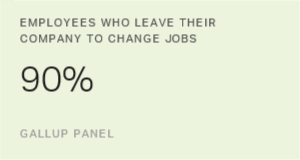Two forces have disrupted what is traditionally called "performance management" -- changing it to something more accurately described as "performance development."
Organizations have discovered that their current performance management systems aren't yielding the ROI they assumed. Just one in five employees strongly agree that their company's system motivates them. Large organizations spend tens of thousands of hours and tens of millions of dollars on activities that not only don't work, but also drive out top talent.
The future of work is being shaped by extraordinary changes in technology, globalization and overwhelming information flow. Workers, particularly millennials, are asking for something different. They want a coach, not a boss. They want clear expectations, accountability, a rich purpose, and they especially want ongoing feedback and coaching.
The need to dramatically change the way employees are managed couldn't be more urgent. Bluntly, what we've known as performance management has failed. Gallup estimates the cost of poor management and lost productivity from employees in the U.S. who are not engaged or actively disengaged to be between $960 billion and $1.2 trillion per year.
To help organizations everywhere tackle the problem of poor management, Gallup set out to learn everything we could about the current state of performance management. We reviewed and evaluated our own databases of more than 60 million employees, as well as large-scale meta-analyses from researchers outside of Gallup containing hundreds of studies on goal setting, feedback, engagement, individual differences and competencies. We interviewed top scientists, leaders, managers and employees. We wanted to learn what the best science had to say, as well as which insights were the most useful and actionable from leadership to the front line.
On the positive side, the research reveals there are better, newer ways to improve management and productivity dramatically, and it reveals how to turn traditional performance management into performance development. Yet, Gallup also found organizations overlooked, or bypassed, established scientific findings -- that have been swept away by fads.
Specifically, traditional performance management systems have struggled to inspire and develop employees because their approach leads to:
- unclear and misaligned expectations
- ineffective and infrequent feedback
- unfair evaluation practices and misplaced accountability
Instead, organizations can transform their managers into coaches by teaching them to effectively and cohesively:
- establish expectations
- continually coach
- create accountability
Gallup's research also yielded the following key findings and insights into critical components of performance development:
Employees whose manager involves them in goal setting are four times more likely to be engaged than other employees. Yet this basic expectation only occurs for 30% of employees.
Frequency of feedback alone can boost engagement three fold. But the feedback needs to be meaningful, that is to say, it has to be based on an understanding of the individual's strengths. As a general rule, managers should coach their employees by providing meaningful feedback at least once per week. These coaching conversations can vary from daily "quick connects" to recurring "check-ins" to "developmental coaching."
While many organizations are moving away from their annual review systems, accountability is still important. Progress reviews should occur at least twice per year, focusing on purpose, goals, metrics, development, strategy, team and personal life. As such, these reviews should be achievement oriented, fair and accurate, and centered on development.
Performance measurement needs to be blended with individualized development. Without the two in harmony, performance measurement can be perceived as a threat and development as disconnected from the business.
Through a review of 559 roles and 360 behavioral job demands, Gallup found performance review measurement can be collapsed into three key dimensions that describe and predict overall success in a role:
* individual achievement = My Work
* team collaboration = My Team
* customer value = My Customer
To blend performance measurement and accountability with individual development -- and to turn activities perceived as threatening into something more positive and constructive -- organizations need to consider multiple sources of information:
- quantitative metrics that are within employees' control and reflect key outcomes, such as productivity, profitability, accuracy or efficiency
- subjective observations that qualitatively reflect performance in terms of role expectations and allow a manager to provide feedback that helps put performance in context
- individualized goals that take into account each team member's expertise, experience and unique job responsibilities, alongside the general responsibilities of the job
When managers take multiple sources of information into consideration, measurement becomes more reliable and accurate. And it also leads to rich discussions that are developmentally meaningful.
For organizations and managers, the need to shift from performance management to performance development couldn't be more urgent. More than 90% of employees who change jobs leave their company. What employees -- and particularly those in the up-and-coming millennial generation -- want in a new organization is overwhelmingly "career progress."
Employees today demand more from their companies. They are asking for meaningful work and managers who care about them as people and provide ongoing communication, clear work expectations, and opportunities to learn and grow. This requires extreme alignment and harmony in how organizations develop people and hold them accountable.
This article is part of Gallup's research on the changes in performance management. To learn more, we invite you to:
- Download the Re-Engineering Performance Management research paper.
- Watch our webinar "Re-Engineering Performance Management" on May 17.
- Contact us to partner with Gallup and improve performance management.


